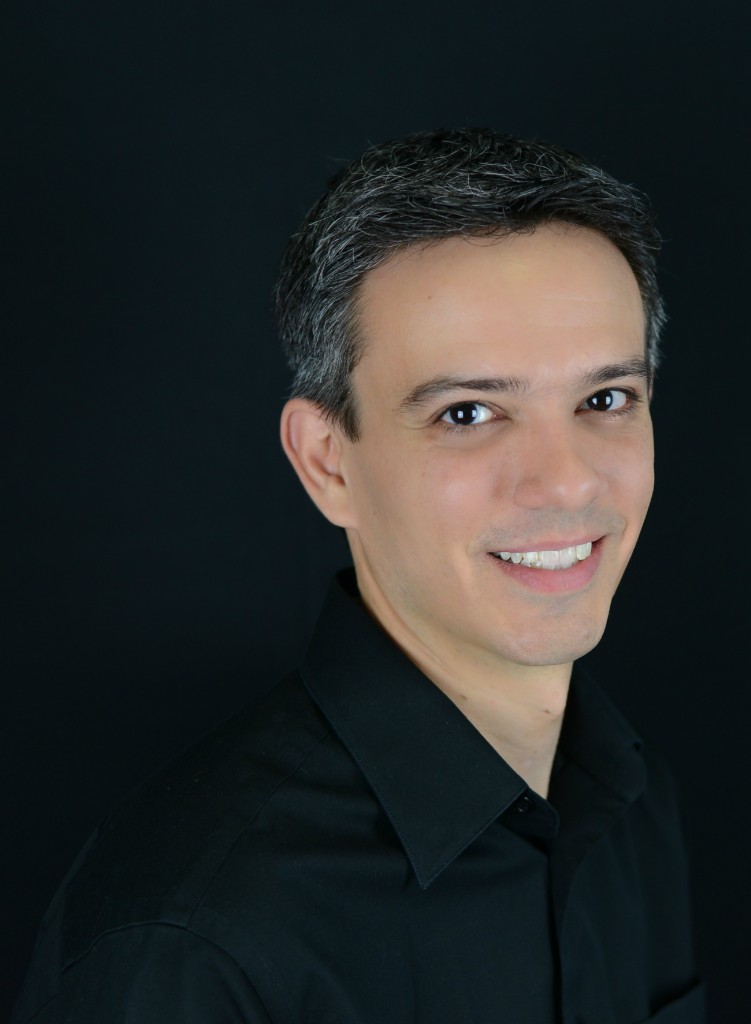Chorus pro Musica serves globetrotting buffet with strings attached

Jamie Kirsch conducted a concert by Chorus pro Musica Saturday night in Cambridge. Photo: Santa Mila
It’s curious, how giving a concert a unifying theme can lead to the most wildly diverse results.
During their program Saturday night at First Church in Cambridge, titled “Strings Attached” to highlight the ways stringed instruments can interact with human voices, the singers of Chorus pro Musica probed the spiritual depths of a Bach motet, barked and yipped like the Grammy-winning Bulgarian women of a few years back, and poured out sentimental harmonies as lush as Christmas pop—all for starters.
Attention never flagged during the concert’s hour-and-a-quarter without intermission, as “something completely different” was always in the offing. As with New England weather, all one had to do was wait a minute.
Bach’s funeral motet Komm, Jesu, komm itself sent a mixed message, typical of the Pietistic texts he often used, of weariness with this life and ecstatic yearning to be united with Christ. Conductor Jamie Kirsch ably steered the ensemble through the first stanza’s ever-changing tempos and meters (the second was set more straightforwardly as a chorale).
Violinists Sharon Leventhal and Asuka Usui, cellists Jacques Lee Wood and Megan Koch, and organist Terry Halco, though outnumbered by the 80-or-so choristers, could be heard putting a firm foundation under the voices with a Baroque-style straight tone.
The choral parts were well balanced, but in a resonant space that ate up singers’ diction, a little more effort to project the German words would have given the performance more impact.
The same could be said of Max Bruch’s An die Musik, a heartfelt hymn of praise to this spirit-lifting art, but one still admired the way Kirsch and the singers subtly varied the emotional message from one stanza to the next.
Then, in a single leap, the program departed the German-Jewish drawing room of the Victorian era for a contemporary trip on the Silk Road. Judging from her program biography, the Greek-American composer Abbie Betinis is a world traveler through music. Her 2007 piece for accompanied women’s chorus, From Behind the Caravan: Songs of Hâfez, found her in 14th-century Shiraz, Persia, studying the Sufi poetry of Khwajeh Hâfez-e Shirazi and setting it to music inspired by Persian and Turkish speech rhythms and scales.
If the result was, as the composer writes in a program note, “not at all authentically Persian,” it was certainly ear-catching in its exotic vocalizing and dancing syncopations. The lively choral sections were crisply executed to the driving beat of percussionist Peter Pulsifer’s tambourine and hand-clapping, abetted by Wood’s eager cello.
Nine members of the choir sang solo phrases in a raw, piping folk style. Two solo interludes for oud (a Middle Eastern lute), performed softly but with soul and fire by Ghassan Sawalhi, had the feeling of inspired improvisations.
The young Latvian composer Eriks Ešenwalds has found a local champion in his countryman, BSO music director Andris Nelsons, who made a positive (if conservative) impression in Symphony Hall last season with Ešenwalds’s impressionistic choral piece Lakes Awake at Dawn.
On Saturday, Ešenwalds’s The Earthly Rose, a 2013 setting of a wistful poem of departure, return, and decay by Emma Jones, slid into choral pop, its harmonies loaded with juicy suspensions, enhanced still further by the lush tone of harpist Amanda Romano.
It was time again for something bracing, and choir and violinist Leventhal delivered in style with Stafford Diptych, Op. 417, by John McDonald. (The program described the composer as a professor and department chair at Tufts University and pianist in two chamber ensembles, but did not explain how such a person could also achieve opus numbers in the four-hundreds.)
The chorus effectively intoned the wry, ironic texts by William Stafford in gently jerky rhythms and dry harmonies that favored the hollow sound of open fifths.
Violinist Leventhal led the way throughout, alternating with the chorus in spiky, virtuosic, multiple-stopping violin solos, which backed off at times into affecting, dissonant laments. Her vivid playing provided the most arresting music of the evening, rivaled only by the exotic choruses of the Betinis piece.
Lights in the church were lowered for John Tavener’s Svyati, a mystical setting of an ancient Russian Orthodox prayer featuring cellist Wood as the high priest and the chorus as monks chanting at a glacial pace. Wood’s playing rose in pitch and grew splendidly in religious fervor as the chorus sustained impeccably tuned, impossibly long chords, presumably by means of staggered breathing.
Here the church’s resonance served rather than hindered the music, as the room filled with the mesmerizing sound for which this composer is known. The piece’s leisurely, evanescent ending was beautifully sustained to the last super-pianissimo murmur.
The parade of present-day composers continued with Dan Forrest’s attractive setting of a traditional folk song, The Nightingale, for chorus, piano four hands, and—since the song’s love interest is a soldier boy with a fiddle—Leventhal again with her violin, adding a comment here and there and taking a whole verse herself. Pianists Halco and Jim Barkovic did their best to project their rippling accompaniment and bits of counterpoint through the church’s blurry acoustics.
Amid all these contemporaries, songwriter Harold Arlen sounded like a visitor from another century—as indeed he was—in his jaunty classic I’ve Got the World on a String, arranged for chorus and piano by Paul Langford. Acoustics were again an issue as pianist Halco and conductor Kirsch strove to convey the music’s smart, jazzy syncopations, but the chorus sang with enthusiasm and earned warm applause at the end.
The next performances of Chorus pro Musica will be a Family Holiday Concert with the Boston City Singers, Dec. 6 at Hibernia Hall, Roxbury, and Candlelight Christmas, Dec. 18 at Old South Church, Boston.choruspromusica.org; 800-658-4276.
Posted in Performances



